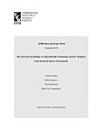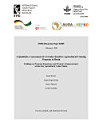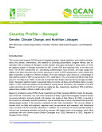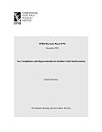Senegal at a crossroads: Prioritizing large-scale food fortification under financial uncertainty
Resnick, Danielle · Diatta, Ampa Dogui
Sep 2025 · IFPRI Discussion Papers Book 2363 · Intl Food Policy Res Inst
Ebook
67
Pages
family_home
Eligible
info
reportRatings and reviews aren’t verified Learn More
About this ebook
Senegal long has been committed to large-scale food fortification (LSFF), especially for salt, edible oil, and wheat flour, bolstered by a set of multi-sectoral nutrition strategies and institutional coordinating mechanisms. Yet, due to recent macroeconomic pressures and reductions in donor funding, the country is at a crossroads, revealing key gaps in the sustainability of its current LSFF program even as new vehicles, such as rice and bouillon, are emerging on the fortification policy agenda. Based on interviews with over two dozen public, private, and civil society sector actors, we utilize the Political Economy Diagnostic of Large Scale Food Fortification (PEDAL) to highlight strengths of the Senegalese LSFF program and weaknesses that need to be prioritized. Among the latter include the stalled financing for the national fortification alliance, known as COSFAM, insufficient testing materials and laboratories, and rising costs of premix and raw materials. Several innovations were promoted by respondents to address some of these challenges, including either the decentralization or regionalization of laboratory capabilities, a central buying center for premixes, and online data platforms to track compliance. By reflecting on Senegal’s long experience and current challenges with scaling its fortification efforts, the analysis provides useful insights to countries with more nascent fortification programs about the prerequisites for ensuring LSFF sustainability.
Rate this ebook
Tell us what you think.
Reading information
Smartphones and tablets
Install the Google Play Books app for Android and iPad/iPhone. It syncs automatically with your account and allows you to read online or offline wherever you are.
Laptops and computers
You can listen to audiobooks purchased on Google Play using your computer's web browser.
eReaders and other devices
To read on e-ink devices like Kobo eReaders, you'll need to download a file and transfer it to your device. Follow the detailed Help Center instructions to transfer the files to supported eReaders.











